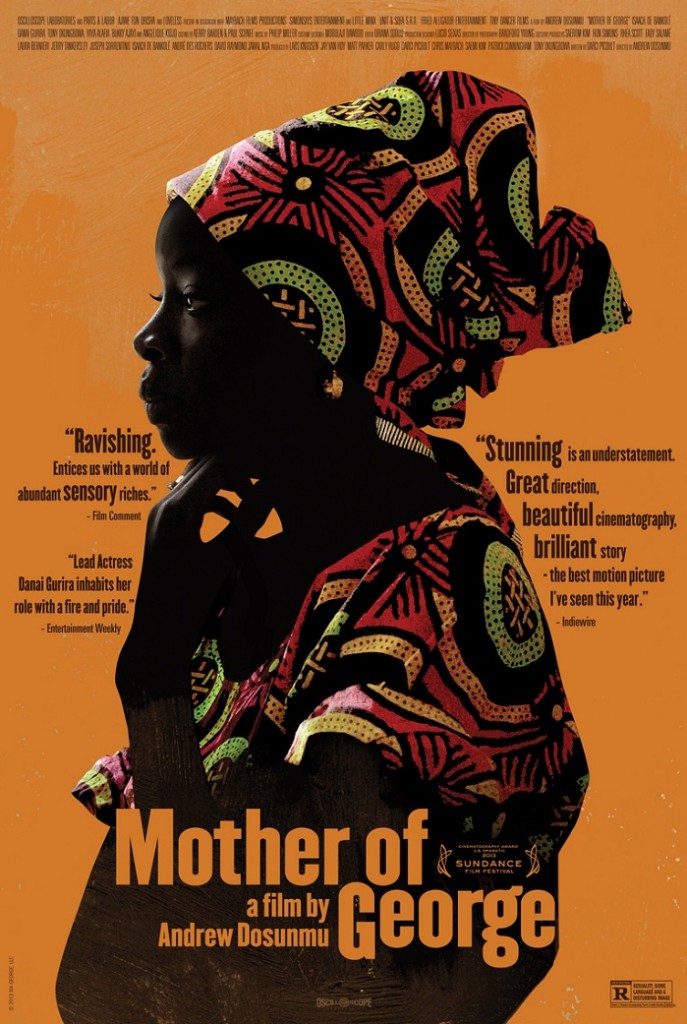
MPAA Rating: R
Director: Andrew Dosunmu
Film Pulse Score: 7/10
Nigerian filmmaker Andrew Dosunmu continues to collaborate with one of the best cinematographers working today – Bradford Young; Mother of George happens to be Dosunmu’s sophomore effort, after 2011’s Restless City (also shot by Young), focusing on the lives of African immigrants (specifically Nigerians) residing in New York City this time based on a script from first-time screenwriter Darci Picoult about a newlywed Nigerian couple and their trouble with conceiving.
Mother of George begins with, what appears to be, a traditional Nigerian wedding ceremony; a beautifully captured parade of color, life and culture, bringing together Ayodele (Isaach De Bankolé) and Adenike (Danai Gurira), the central couple of the film. Ayodele bows before his elders while they administer advice, prayers, hopes and dreams; while, Adenike graciously accepts gifts of fruit pertaining to various aspects of her new, yet to be lived, life as a wife and mother. All of these actions are a precursor to real goal, the real hope that everyone shares in the wedding party – that is to have children. As quick as possible and, at least, four – minimum.
That’s Adenike’s life now – produce children for her husband, Ayodele, but more importantly for Ayodele’s mother, Ma Ayo (Bukky Ajayi). This becomes her reason for existence – to produce offspring – which should be easy enough considering couples conceive constantly by accident so there should be no pressure. The only pressure that exist for Adenike is that failing to produce offspring equates to failing as a wife (or essentially as a woman) in her culture. Again, no pressure.
Unfortunately, Ayodele and Adenike do have trouble conceiving a child…but, not without trying; it seems they are trying at any given opportunity, yet no pregnancy. For most, the problem of conceiving a child would be a troublesome situation, but within Adenike’s community and culture it’s tantamount to failing to deliver upon a promise. Failing to fulfill your only reason for existence. It’s a problem that confounds cultural expectations, causing Ma Ayo to call for desperate measures. Either, Ayodele should produce a child with another woman or Adenike should find another avenue for conception. This is the basis for Mother of George – Adenike desperately needs a pregnancy and will do so by any means necessary out of love for her husband and in an attempt to save her marriage.
This deceptively simple narrative relies heavily upon strong central performances to succeed and luckily for Dosunmu, Isaach De Bankolé and Danai Gurira are up to the task. De Bankolé does an admirable job as the hard-working husband that wholly and completely loves his wife, but also happens to be a little apprehensive to Western medicine. The real standout, performance-wise, comes from Danai Gurira as Adenike the loving wife who will do anything and everything to provide for her husband, even making emotionally devastating decisions to bring happiness to Ayodele and his Mother. Gurira effectively communicates all of the complicated emotions frought with the cultural and familial pressures of producing children even though all attempts have failed.
The other standout has to be Bradford Young’s cinematography, which won him the Cinematography Award at this year’s Sundance Film Festival along with his work on Ain’t Them Bodies Saints, an exquisite mixture of slow-motion, soft focus and stunning portrait-style photography. All of which could easily be lifted from the screen and framed, a welcomed addition to any wall, gallery or otherwise. The most prominent aspect of Dosunmu and Young’s collaboration happens to be the heavy use of close-ups; the viewer is thrust into the world and culture of the film’s characters, completely ignoring the film’s setting and surroundings which is remarkable since their films are set within the expanse of New York City. They happen to be New York films without ever showing New York itself, which is unusual given that most (if not all) New York films the city plays such an important role.
Dosunmu and Young have, once again, magnificently captured a struggle involving African immigrants in New York City through a carefully constructed narrative from Darci Picoult. Director Andrew Dosunmu and cinematographer Bradford Young’s collaborations are quickly growing in skill and beauty, deftly constructing and presenting stories of immigrant and cultural struggles with grace and elegance. Here’s hoping that Dosunmu and Young continue to collaborate, well into the future.






